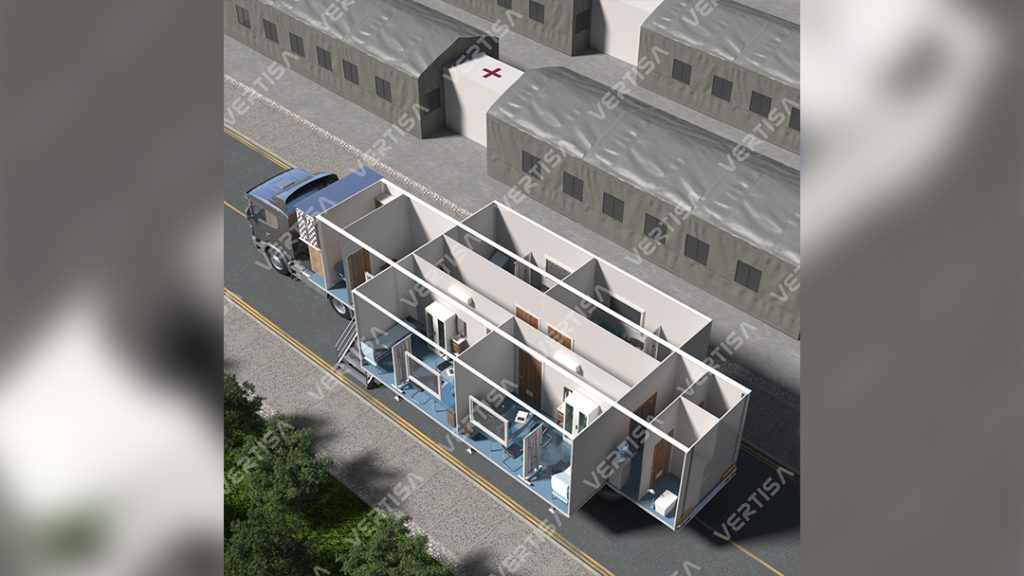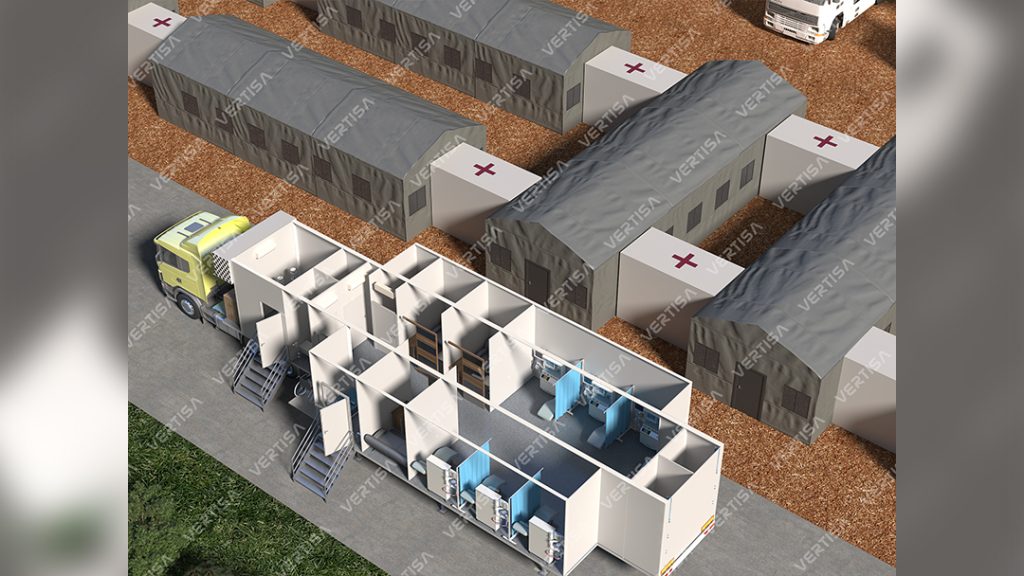In the dynamic landscape of modern healthcare, the concept of a “modular operation theatre” has emerged as a game-changer. This article delves into the multifaceted role of modular operation theatres, highlighting their advantages, implications, and potential to elevate surgical procedures and patient outcomes.
Introduction:
Evolution of Surgical Environments: Unveiling the Power of Modular Operation Theatres
Modular operation theatres represent a paradigm shift in surgical infrastructure. These innovative spaces are designed for versatility, efficiency, and advanced patient care. This article aims to provide a comprehensive exploration of the concept of modular operation theatres, shedding light on their benefits, key considerations, and transformative impact on the healthcare landscape.
Advantages of Modular Operation Theatres:
- Optimized Surgical Workflow: Streamlined Setup for Enhanced Efficiency
Modular operation theatres are engineered with precision to optimize surgical workflow. Pre-fabricated components and state-of-the-art technology ensure a seamless setup, reducing the time required for preparation between procedures. This efficiency not only enhances the utilization of healthcare resources but also enables surgeons to focus more on patient care and intricate surgical procedures.
2.Infection Control and Sterility: Elevating Patient Safety Standards
Maintaining a sterile environment is paramount in surgical settings. Modular operation theatres integrate advanced air filtration and purification systems to minimize the risk of infections. The controlled airflow and sterile surfaces contribute to a reduced likelihood of surgical site infections, fostering better patient outcomes and faster recovery.
3.Adaptability and Scalability: Tailored Environments for Diverse Specialties
Modular operation theatres offer adaptability to accommodate various surgical specialties. The layout and equipment can be customized to meet the specific needs of different procedures, from orthopedics to neurosurgery. This flexibility minimizes the need for extensive renovations and allows healthcare facilities to adapt quickly to changing medical demands.
Key Considerations for Implementation:
- Design and Layout Optimization: A Fusion of Functionality and Ergonomics
Creating an effective modular operation theatre involves meticulous design and layout planning. The arrangement of surgical equipment, lighting, and storage areas must be optimized to enhance the surgical team’s efficiency and comfort. An ergonomic design not only improves the working environment for healthcare professionals but also contributes to safer and more successful surgeries.
2.Technology Integration: Harnessing Innovation for Surgical Excellence
Technology is at the core of modular operation theatres. Integration of advanced imaging systems, real-time monitoring tools, and telemedicine capabilities enhances surgical precision and collaboration. Surgeons can access critical patient data, consult with colleagues, and utilize imaging guidance—all within the confines of the modular theatre.
3.Regulatory Compliance and Certification: Ensuring Quality and Safety
Meeting regulatory standards and obtaining relevant certifications are essential steps in implementing modular operation theatres. Compliance with guidelines related to infection control, fire safety, and medical equipment is crucial to ensuring patient safety and the seamless operation of these advanced surgical environments.
Transformative Impact on Patient Care:
- Enhancing Surgical Outcomes: Precision and Safety in Complex Procedures
The precision and technology integration offered by modular operation theatres directly contribute to improved surgical outcomes. Surgeons can perform intricate procedures with greater accuracy, leading to reduced postoperative complications and shorter hospital stays for patients.
2.Reduced Downtime and Increased Efficiency: A Catalyst for Healthcare Productivity
The streamlined setup and adaptability of modular operation theatres result in reduced downtime between procedures. This efficiency translates into higher patient throughput and increased utilization of healthcare resources, ultimately benefiting both patients and healthcare institutions.
3.Advancing Medical Education and Training: A Hub for Skill Development
Modular operation theatres also serve as invaluable platforms for medical education and training. Aspiring surgeons can observe complex surgeries, learn advanced techniques, and engage in simulated procedures within these cutting-edge environments. This immersive learning experience contributes to the development of skilled and confident healthcare professionals.
Future Innovations and Advancements:
- Robotics and Automation: Redefining Surgical Precision
The integration of robotics and automation holds great promise for the future of modular operation theatres. Robotic-assisted surgeries can enhance precision, reduce invasiveness, and lead to faster patient recovery. Modular theatres can be designed to accommodate robotic systems, ushering in a new era of surgical innovation.
2.Virtual Reality (VR) Integration: Immersive Surgical Planning
Virtual reality technology can be seamlessly integrated into modular operation theatres for surgical planning and training. Surgeons can visualize procedures in a virtual environment, practice complex maneuvers, and refine their skills before entering the operating room. This integration enhances surgical preparedness and contributes to optimal patient outcomes.
3.Remote Surgery and Telemedicine: Overcoming Geographic Barriers
Modular operation theatres equipped with telemedicine capabilities enable surgeons to perform procedures remotely, bridging the gap between patients and expert surgeons regardless of geographical location. This advancement has the potential to revolutionize access to specialized surgical care, particularly in underserved or remote areas.
Sustainability and Environmental Considerations:
- Energy Efficiency: Green Initiatives for Healthcare Facilities
As the healthcare sector places a growing emphasis on sustainability, modular operation theatres can incorporate energy-efficient technologies and renewable energy sources. LED lighting, solar panels, and energy management systems contribute to reducing the carbon footprint of healthcare facilities while maintaining high standards of patient care.
2.Reusable and Recyclable Materials: Minimizing Waste
Modular construction allows for the use of reusable and recyclable materials, minimizing construction waste and contributing to environmentally responsible practices. Designing modular operation theatres with eco-friendly materials aligns with the global movement toward sustainable healthcare solutions.
Collaboration for Advancing Healthcare:
- Interdisciplinary Integration: Fostering Collaborative Care
Modular operation theatres provide an ideal environment for interdisciplinary collaboration. Surgeons, anesthesiologists, nurses, and other healthcare professionals can work closely together in a well-designed space, facilitating efficient communication and teamwork. This collaborative approach translates into comprehensive patient care and improved surgical outcomes.
2.Global Knowledge Exchange: Sharing Best Practices Worldwide
The adoption of modular operation theatres presents an opportunity for global knowledge exchange. Healthcare institutions can share best practices, lessons learned, and case studies to inspire advancements in surgical care. This cross-border collaboration contributes to the continuous improvement of healthcare practices on a global scale.
Conclusion: Pioneering a New Era in Surgical Innovation: The Promise of Modular Operation Theatres
In the grand narrative of medical progress, modular operation theatres emerge as a chapter of transformation and possibility. These advanced environments embody the fusion of precision, technology, and patient-centricity, setting the stage for a future where surgical excellence knows no bounds.
The future of surgical innovation is undeniably intertwined with the evolution and expansion of modular operation theatres. These cutting-edge environments epitomize the fusion of medical expertise, technological advancement, and a patient-centric approach. As healthcare systems worldwide continue to embrace modular operation theatres, they are catalyzing a paradigm shift in surgical care that has the potential to redefine the boundaries of medical achievement.
Global Accessibility and Healthcare Equity:
- Addressing Disparities: Bridging the Healthcare Gap
Modular operation theatres have the potential to address healthcare disparities on a global scale. By providing a standardized and technologically advanced surgical environment, these theatres can ensure that patients, regardless of their geographic location or economic status, have access to high-quality surgical interventions.
- Medical Tourism and Cross-Border Care: A New Frontier
The implementation of modular operation theatres can also stimulate medical tourism and cross-border healthcare. Patients may travel to regions with state-of-the-art modular facilities to receive specialized surgical procedures, contributing to economic growth and knowledge exchange between healthcare systems.
Patient-Centric Care in Focus:
- Enhancing Patient Experience: A Holistic Approach
Modular operation theatres amplify patient-centric care by incorporating design elements that enhance patient comfort and well-being. Patient-friendly features such as soothing lighting, noise reduction measures, and ergonomic layouts contribute to a more positive surgical experience.
2.Personalized Surgical Environments: Tailored for Individual Needs
These theatres can be tailored to meet the unique needs of individual patients. Surgeons can adjust lighting, equipment placement, and other variables to ensure optimal conditions for specific procedures. This personalization enhances patient outcomes and underscores the commitment to individualized care.
Resilience and Preparedness:
- Emergency Response Readiness: Adapting to Crisis
Modular operation theatres are well-suited for emergency response scenarios. During times of crisis, such as disease outbreaks or natural disasters, these theatres can be rapidly deployed to provide essential surgical services. This adaptability contributes to healthcare systems’ resilience and preparedness in the face of unforeseen challenges.
Final Thoughts: Pioneering a New Frontier in Surgical Advancement: The Era of Modular Operation Theatres
In the chronicles of medical progress, modular operation theatres stand as a testament to human ingenuity, dedication, and the relentless pursuit of excellence. These innovative spaces encapsulate the ethos of modern healthcare—precision, accessibility, and patient-centered care.



